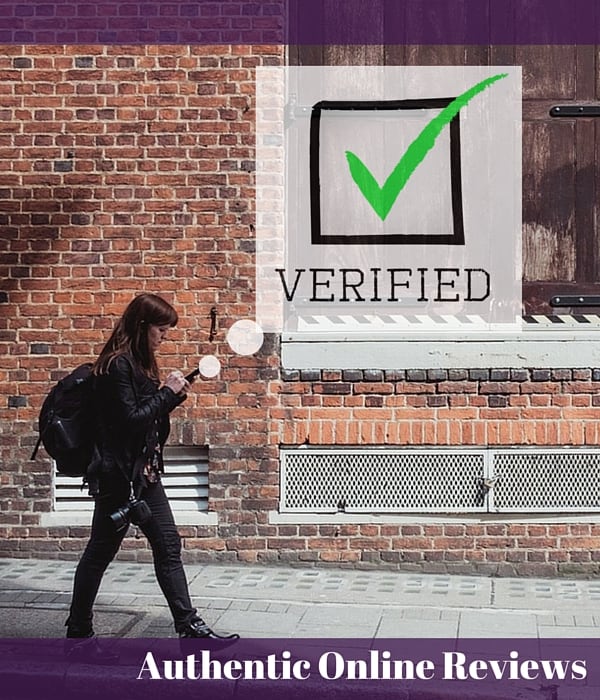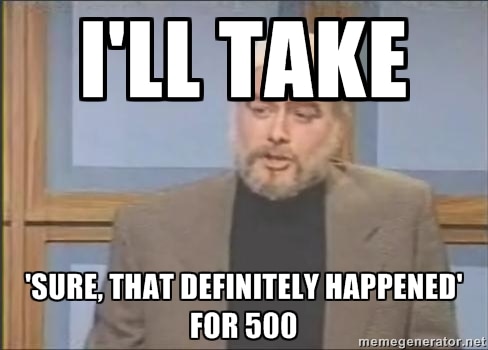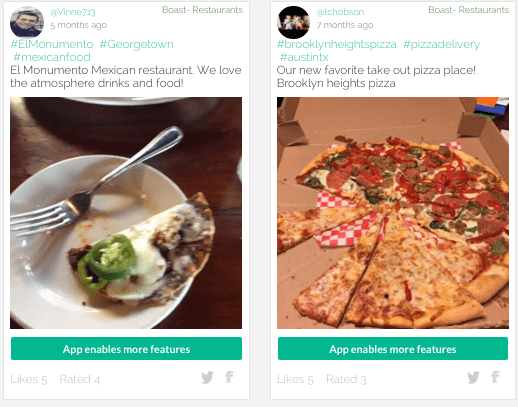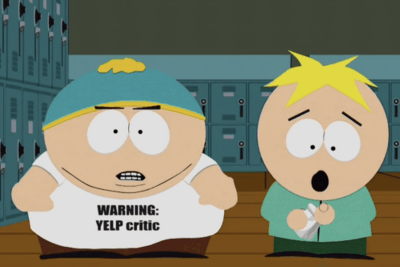
Tom and Landon are separated by the Atlantic Ocean. Though they might not describe themselves as such, they’re both advocates– but upon first glance, they’re on opposite sides of the conflict.
Tom is based in England. He’s a restaurant inspector who wages a good-humored battle against fake reviews, both through his writing and through social media. Tom pushes for authentic online reviews on behalf of businesses— namely, local restaurants.
“You look at TripAdvisor, and their business model is so biased towards the consumer. But it only exists because of businesses and products.
When you encounter restaurant industry people and see how upset [TripAdvisor reviews] make them, and when you know them, and what makes them good… it seems TripAdvisor’s message and platform are unfairly weighted toward people who contribute content, rather than businesses,” says Tom.
Landon, on the other hand, fights for the people who create review content. He lives in Austin, TX, where he works in real estate. But he’s an app developer, too. Through his app, he strives to bring consumers authentic reviews they can trust. He, too, is concerned with fake reviews.
“… everybody researches products online and reads reviews before they buy. Many of them don’t understand that there’s no verification behind those reviews. They’re spending their hard-earned money on things, and they see a review that somebody at a company overseas was paid fifty cents to write,” says Landon.

Tom knows what fake reviews cost businesses. Landon knows what fake reviews cost consumers. On the surface, it seems like Tom’s business advocacy and Landon’s consumer advocacy might be opposed to one another.
But nothing could be further from the truth.
No Receipt, No Review
Tom (last name withheld), known as @EaterWriter on Twitter, is a restaurant inspector who writes for three of the UK’s main restaurant guidebooks. Throughout the course of his work, he speaks with many restaurant owners.
Tom also started the #NoReceiptNoReview campaign on Twitter. As you can see from the linked search, it blew up late last year. Tom was advocating that TripAdvisor (which is much bigger in the UK than Yelp) only post reviews from verified customers. It brought to light a lot of the angst businesses feel about third-party review sites like TripAdvisor and Yelp.
Dear @TripAdvisor This makes a lot of sense to me. #noreceiptnoreview https://t.co/fl7ZVbJVXR
— Jay Rayner (@jayrayner1) October 18, 2015
@jayrayner1 An example: 4 friends dine at a restaurant, but only 1 receipt for meal. So 3 genuine diners denied right to review #unfair 2/2
— TripAdvisor UK (@TripAdvisorUK) October 19, 2015
As such, it was featured on The Guardian (and backed by their popular food critic Jay Rayner), The Drum, CBS News, Marketing Land, Naked Security, and at least a dozen marketing and reputation management publications.
Though the Twitter campaign isn’t trending anymore, fake reviews remain a real problem. USA Today mentioned #NoReceiptNoReview recently also.
That article cites these statistics from research and expert interviews:
- Experts estimate anywhere from ⅓ to ½ of online reviews are fake
- 65% of consumers trust the reviews on review sites
- 52% of consumers trusted the reviews on a business (hotels, in this case) branded site
Reviews are big business. A study from Harvard Business School finds a one-star increase in Yelp rating leads to a 5% to 9% increase in revenue for any given restaurant. Because reviews are revenue generators, there’s incentive to cheat. Fake reviews are everywhere.

Tom is having none of it. I spoke with him on the phone earlier this month. He’s polite, cheery, funny, and whip-smart. Whether his hashtag is trending or not, he’s still giving this some serious thought.
Get Blog Updates
“if you follow [a review content-driven business model] through, it creates bad feelings towards TripAdvisor and Yelp. Those bad feelings exist within the industry that [consumers] produce content about. in the restaurant sector, people don’t like TripAdvisor,” says Tom.
Receipts would provide a layer of authenticity and credibility, in Tom’s eyes.
“If a user has to provide ID and use a real name, it’s much more reliable. Because they’re completely anonymous right now, users can just shut the [fake] account down and go,” he says.
TripAdvisor disagrees. I reached out to them and got this quote in return:
Requiring a receipt to write a review would unfairly penalize the many genuine customers who don’t have one – we think that is neither fair nor useful to consumers, since the effect would be to reduce the volume of genuine reviews on the site.
The model advocated by the #noreceiptnoreview campaign also wouldn’t prevent the most common type of fraud attempted – property boosting – as nobody has better access to receipts than a property owner themselves.
We believe our fraud detection model, which utilizes sophisticated techniques similar to those adopted in the banking sector, is more effective and is the model that most consumers prefer.”
Tom, for his part, understands their point of view. As he sees it, there’s no real legislation regarding fraudulent reviews, so sites like TripAdvisor and Yelp can post whatever they want– as long as it’s not attributed to them directly. The review is attributed to the reviewer; not to TripAdvisor or Yelp.
From Tom:
TripAdvisor says receipts limit the consumer. Not everyone has a receipt. This is completely correct if you approach it from the consumer side and neglect the business side. They’re correct in that consumers will be restricted, but you have to look at a balance between business and consumers.
[TripAdvisor/Yelp]’s business model is based on numbers. How many reviews, how many clicks. They make it easy for consumers, but in the long run, you have to consider businesses.
The pendulum is eventually going to swing the other way towards businesses.”
Tom thinks verifying those reviews, through receipts or otherwise, would be better for Yelp and TripAdvisor’s brands in the long run. He thinks they should want to protect businesses as well, because they play an equal role to the consumer.
Even post-#NoReceiptNoReview, Tom sees authenticity as the key.
Almost Eye-to-Eye
“[Fake reviews are] a massive problem and, fortunately, in the Fall of 2015 it started picking up in the press. Amazon started suing people, the #NoReceiptNoReview campaign started picking up on Twitter, which we were super happy to see,” says Landon Hobson.
I spoke with Landon on the phone as he took a stroll through downtown Austin, hoping to find a good spot for a late breakfast. Landon is affable, but he has an air of wisdom about him, even over the phone. As with all good realtors, he’s easy to talk to.

Landon Hobson is the founder and CEO of Picky, a review app that focuses on authenticity, social interaction between users, and accessibility. It’s been featured on Product Hunt, StartupBeat, and Built in Austin, among other publications.
Picky uses 60 second video reviews, which show consumers with the products they’ve purchased or at the restaurants they’re reviewing. If the user provides no visual proof of the product or place in their review, it’s flagged for removal by Picky’s community. This system means Picky’s reviews are verified, but it also allows Picky to function as an informative, entertaining social platform.
It’s described as “Vine meets Yelp with 60-second verified reviews.”
Picky was influenced both by Vine, for its lightning-fast video sharing, and by the success of YouTube product reviews. (Expect RevenueJump to explore Picky more thoroughly in an upcoming blog post.)
As an example, take a look at their restaurant category.
With Picky, there’s no hiding. The reviews have to be authentic.
From Landon:
It’s so easy to get paid to write fake reviews in the text review world. There are so many reasons to not be authentic and genuine. But I think consumers who value credible, real, consumer information would be the ones that would give that [authentic] information.
I would hope that’s the way the world looks at giving their opinion on something they purchased. I think that’s a problem Picky solves. Showing your face in a video and showing a product, it’s a lot more difficult to lie and be misleading, because you’re actually showing your face. You’re not looking at people eye-to-eye, but you almost are.”
By his estimate, Landon got into the review world about three years ago, when he worked on bringing verified reviews into the real estate industry. He was amazed at how many misleading and fraudulent reviews existed in the apartment industry.
He and his cofounder succeeded with bringing verified reviews to the world of Austin real estate. They dominated Google’s search results. Eventually, though, they looked at the bigger picture– they saw fake reviews as a humongous problem beyond the real estate industry, and they also saw a gap in the market.
Thus, Picky was born.
“We started because we felt the pain as consumers, not getting the information we wanted. We’re all about giving consumers the best information possible,” says Landon.

Much like Tom, Landon sees the third-party review companies as the people who hold all the power in the online review space. While Tom advocates for the restaurants and the good people he knows in the industry, Landon is more concerned with the consumer.
Consumers, he says, are starting to become hyper-aware of fake and misleading reviews, especially those that are bought and paid for.
From Landon:
I think consumers are, due to the press and how product reviews are evolving, are starting to be aware that they just can’t read something and take [the reviewer’s] word for it. They need multiple reviews. They might need to see more than ten reviews on a product. That’s really why we founded Picky. We wanted to bring consumers one place to go for reviews. We’re not a review company like Yelp, Angie’s List, or TripAdvisor that’s filtering reviews and trying to decide if this is authentic or not. We empower the people to do that.
I hope consumers get that control back instead of the review companies having that control. In allowing them not to only filter and police it, but for them to decide which reviews are the best ones out there.”
Landon also notes that, in the future, he’d like for consumers to waste less time sifting through pages of (often untrustworthy) content.
Authentic Online Reviews: Making Changes
Tom and Landon both see the lack of verification from third-party review companies as a series obstacle. Tom thinks business owners get the shaft from a consumer-content focus, which doesn’t (or can’t) weed out fake or misleading reviews. Landon thinks consumers have to wade through too much untrustworthy content.
So, what’s the solution?
Authentic online reviews is the obvious answer. But, how do we get there?
Tom’s Solution(s)
Tom sees two different solutions. He’d like to see businesses be able to opt out of Yelp, TripAdvisor, and other third-party review sites, and he also hints that he might like to see reviewers become licensed. He’s not optimistic about either one happening, he tells me with a laugh.
Instead, he looks to the real world.

But which world is the real world?
“I think it’s difficult to see any changes without legislation. it’s equally difficult to see how that legislation will be pushed through. It will take legal challenges. But you really can’t challenge it, because legal responsibility is pushed to the user, not to TripAdvisor or Yelp,” Tom says.
But, he hasn’t completely given up hope. Tom asks me if I’ve seen the South Park episode about Yelp, called “You’re Not Yelping.” As a side note, that episode was the subject of a funny internet scam that even certain people here at the RevenueJump offices fell for. (you can watch the episode on Hulu)

When I reply that I haven’t seen it, his voice becomes more animated. He sings its praises. For Tom, humor is a key component for holding third-party review companies accountable.
As we’re discussing funny things relating to third-party review sites, I mention Botto Bistro’s crusade against Yelp. They offer a substantial discount on pizza to anyone who gives them a one star review on Yelp, which goes against Yelp’s terms of service.
“Brilliant!” Tom replies.
He also sent out this tweet shortly thereafter:
Absolutely brilliant, ballsy way to take on Yelp. Who wants to do it in the UK with TripAdvisor? https://t.co/X3ZTkGm9zg I will help lots dm
— TomEats (@EaterWriter) January 14, 2016
From Tom:
Reputation management will take a key role in fighting for businesses. But so will part of this cultural phenomenon where [TripAdvisor, Yelp] and their users are lampooned and made to look foolish. if that keeps happening on a wide scale, and people stop seeing these misleading or fake reviews as clever or brilliant, something will change. If you’re TripAdvisor, how do you build trust for your brand? Build trust and make your users more trustworthy
Make users visible, give proof they use the product, give credit to your brand. That’s only going to happen when the widespread image of these brands becomes too tarnished.
I like making a mockery of these brands. I like making them show they care about the businesses. When they care, it becomes legitimate. Until then, whenever I see an opportunity, I will make fun of these companies.”
For now, he’s biding his time.
“I’m not known enough here without to be able to push it. I am not known enough to get coverage. It looks like I have no momentum. I’m biding my time. when I have something I know will take off, I will do it,” Tom says.
Tom notes he’s working on a series of articles for The Guardian, as well. His latest showcases a great response from a restaurant owner from a reviewer who claimed she overpaid for hot water and lemon.
As he bides his time, Tom is fighting the battle for authentic online reviews with his writing and social media.
Landon’s Solution
For Landon, the solution is to encourage more real people to post more real reviews that other consumers know they can trust.
But there’s a real barrier to entry, when it comes to writing text reviews.
From Landon:
We’ve heard from some of our users that the last review they wrote was on Yelp, and it took them 25 minutes sitting in their car at a Chinese restaurant. They wanted to get it off their chest and wanted everyone to know about their experience, but doing that in a car with screaming kids in the backseat isn’t easy. I feel like a lot of people wouldn’t even take the time to write a comprehensive review.
I’ve polled our users, and a lot of people say they’ve never left a text review. They’re on Picky leaving video reviews because we’ve removed that barrier to entry.”
Landon says, just like most of his users, he doesn’t take the time to leave text reviews, either.
“That’s what we’re already proving– we’re making reviewers out of people that aren’t reviewers because we make it simple to do. 60 seconds seems to be the magic number right now,” he says.
Those reviews might be simple, but they’re also authentic. You can see the user’s face. You can see the product. Their personality shines through. They’re real people leaving real reviews— and a simpler, more trustworthy platform empowers them.
In turn, those consumers value authentic online reviews.
“So, I would hope consumers who value information from authentic reviews would want to give the same valuable, authentic information going forward,” he says.
With what Landon suggests, those reviews would pay it forward to businesses. They leave honest, authentic reviews because they actually trust other reviews are honest and authentic. Making reviewers out of a greater number of honest consumers might be the key.

Though Tom fights for businesses and Landon fights for consumers, they’re actually on the same side of the same battle. Their methods are different, but their goals are the same– they want to see a shift toward more authentic reviews.
Verification is at the heart of what Picky aims to do, and Tom is pushing for third-party review companies to verify their reviewers.
Even in a world where all reviews are verified, no business is going to be completely happy all the time. If a certain complaint is repeated over-and-over, that business has some real work to do. Consumers, on the other hand, are savvy enough to spot a review that doesn’t fit the pattern of the other reviews for a product or service. They can tell when a lone reviewer was just throwing a tantrum.
As long as all the reviews are authentic, that is.
Fake reviews are a huge problem for businesses and consumers. Misleading reviews are, as well. Reviews are all about trust, and we all have a lot of work to do if we want to build that trust.
People like @EaterWriter and Landon Hobson are pushing for more authenticity on both sides. For the good of business and consumer, we’d do well to follow their example.
As it turns out, we’re on the same side. Businesses and consumers alike.
We need less fakers, and we need more real reviews for real people.
Question: How do you think we can make online reviews more authentic? Be as realistic or idealistic as you want, and tell us in the comments.






